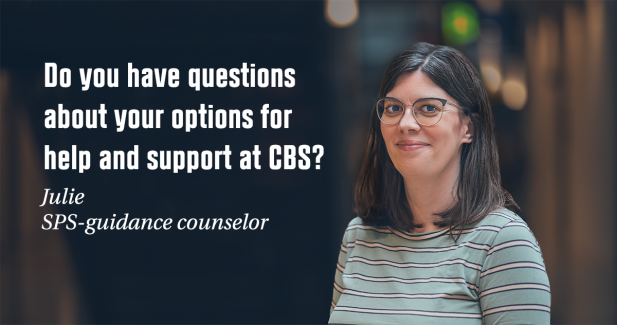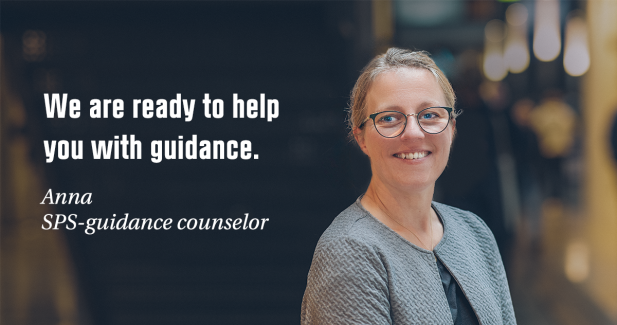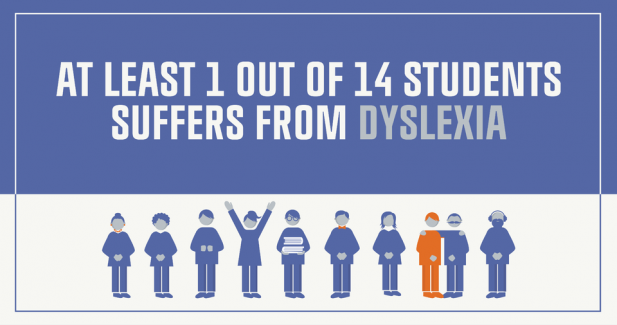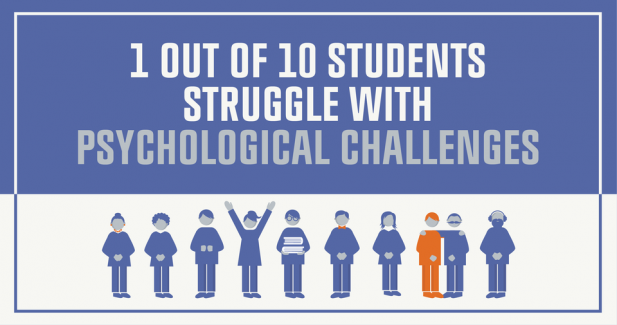In need of special support?
If you are one of the 500+ CBS students with a disability, you can apply for extra support and special conditions. These give you the possibility to study alongside your fellow students on equal terms. Support is always tailored to you and your programme and may include both special educational support (SPS) and special conditions while studying.
Special conditions while studying
When you have a disability, you have the possibility to apply for special conditions that remain in place for the duration of your studies. This could be in the form of extra time for an exam or an individual study plan where, for example, you study on a reduced timetable for a period.
Special conditions for exams
When you have a disability, you can apply for special conditions for exams throughout your study period. Some examples are:
- Extra time for exams
- Sitting written exams at a shielded desk in a quiet room with fewer students
- Bringing extra aids such as headphones, dyslexia software or your own computer
Your exemption follows you throughout your whole study period at CBS
Any special conditions for exams granted to you remain in place throughout your entire time at CBS – this includes switching to a new programme or when you transition from a bachelor degree to a graduate degree. You don’t need to use time to apply for exemptions each semester meaning that you can instead focus on your exams like all other students.
Permanent exemptions are only valid for the conditions that you have previously applied for. This means, if your situation changes and you need additional, or other, conditions than those you initially applied for, you will need to make a new application.
How to apply
You need to apply for an exemption to receive any special conditions to exams. In your exemption application, you should outline which special conditions you require and why you need them. The earliest you can apply for special conditions is once you have been admitted to CBS.
The Special Educational Support (SPS) counsellors hold information meetings in August and September, where they can help you use the exemption application system and guide you through the application process.
Individual study plans There may be periods through your time at CBS, where you have need of an alternative study plan that is adjusted to your needs and where you do not necessarily follow your courses as prescribed. This could be for a number of reasons such as needing to undergo treatment, or going through an exceptionally difficult time meaning that you need to take a short break from your studies or following fewer courses.
How to apply
You need to apply for an exemption to receive any special conditions for exams. You should include the following in your application:
- Your suggested individual study plan
- A description of why you need the study plan
- Supporting documentation
Your student guidance counsellor can help you to make an individual study plan that has been adjusted to your needs. The student guidance counsellor can talk you through your options and discuss the pros and cons of different study plans with you. You can then decide for yourself what fits your needs best and which study plan you wish to include in your application.
Your student guidance counsellor can also talk you through the exemption application system and the application process.
You can only apply for an individual study plan once you have been admitted to CBS.
Special Educational Support – SPS
Special Educational Support, SPS, provides special support and service aids for students with a disability. The support is adjusted to you and your studies so that you can get the best possible help. For example, you could receive a computer with special software installed if you have dyslexia or a sight disability or you can receive a mentor if you need special support during classes.
What kinds of support can you receive?
The support is always adjusted to you and your individual needs, so you get the help that suits you. You can only apply for SPS once you have been admitted to a programme at CBS. Therefore, we cannot say in advance what specific support you can get.
Read more about the different disabilities and the support you can apply for.
Are you dyslexic?
If you are dyslexic, you can apply for service aids and adjustments to enable you to complete your studies on equal terms with your fellow students. You must have an official dyslexia diagnosis to apply for support.
What kind of support can you receive?
The National Agency for Education and Quality is responsible for evaluating which aids and support functions you can be granted. It is based on an assessment of your specific situation.
Typical examples of aids to people with dyslexia are:
- IT starter pack with service programs
- Study support hours at the Copenhagen Adult Education Centre (Københavns VUC)
- Books scanned into pdf files which can then be read aloud by software programs
- Study support during your studies
- Reading strategies and general strategies for course content
- Use of service aids
- Written assignments: overview, structure, breaking assignments into smaller parts etc
- Note taking techniques
Read more about possible support functions and aids on the National Agency for Education and Quality's website (in Danish)
Could you be dyslexic?
You might be dyslexic if you have trouble reading and writing or find it difficult to convert letters into sounds and vice versa.
Symptoms of dyslexia include:
- You get tired or have difficulties concentrating when you read and write
- You switch letters around or use wrong suffixes when you write
- You are a slow reader and find it difficult to learn a foreign language
- You have family members with the same problems
If you recognise some of these symptoms, you might be dyslexic and can be tested.
How to get tested
If you suspect that you might have dyslexia and want to be tested, you must first contact the SPS guidance counsellor at CBS by sending an email to sps@cbs.dk. CBS will then refer you to KVUC (Copenhagen adult education), where you can be tested.
Do you have a psycological disability?
What is a psychological disability?
A psychological disability can, for example, be:
- Social anxiety
- ADHD
- OCD
- A personality disorder
- Bipolarity
- Autism
- Schizophrenia
What kind of support can you receive?
The National Agency for Education and Quality is responsible for evaluating which aids and support functions you can be granted. It is based on an assessment of your specific situation.
You will typically, as a student with a psychological disability, be offered different types of support hours. Support hours can help you with, for example, the following:
- Lack of resources and energy for your studies
- Difficulties with everyday structure in your studies – for example, with larger assignments
- The feeling of being overwhelmed and uncomfortable with study-related pressure
- Difficulties in functioning on a social level, including challenges with going to classes and being with a lot of people
- Uncertainty about your study capabilities and academic competence
Read more about possible support functions and aids on the National Agency for Education and Quality's website (in Danish)
What is a neurological disability?
Some examples of a neurological disability are:
- Long-term effects of concussion
- Chronic headaches
- Brain damage
What types of support can you receive?
The National Agency for Education and Quality assess which service aids and types of support you can receive based on an assessment of your concrete situation.
Typical examples of service aids for students with neurological disabilities include:
- IT service aids such as text-to-speech software and colour overlays
- Ergonomic service aids such as desk, chair, keyboard/mouse, and lamp
- Study support: One-on-one support with structure, planning and inner resources
Read more about possible support functions and aids on the National Agency for Education and Quality's website (in Danish)
Do you have a psysical disability?
What is a physical disability?
A physical disability is understood as a disability that limits your bodily development. It could for example be:
- a physical handicap
- impaired hearing
- impaired vision
- chronic pain
- chronic headache
- arthritis
What kind of support can you receive?
The National Agency for Education and Quality is responsible for evaluating which aids and support functions you can be granted. It is based on an assessment of your specific situation.
Common examples of service aids for students with physical disabilities are:
- Technical support aids to help with aural or visual challenges
- Ergonomic service aids such as desk, chair, keyboard/mouse and lamp
- Dictaphone
Read more about possible support functions and aids on the National Agency for Education and Quality's website (in Danish)
Begin your application for SPS before study start
It can take a while to process applications for SPS, so we recommend that you start your application before study start. This allows for time to acquire the service aids that you may need.
Apply for an early answer to your bachelor application
In some cases, we will be able to pre-admit you so that you receive an answer to your application a little before the standard answer letters are sent out in the end of July. That way there will be more time to get the aids or support you may need.
Apply for pre-admission
In order to be pre-admitted you must:
- Upload documentation for your disability when you create your application for admission at www.optagelse.dk. Please attach the documentation under attachments in the application portal.
- Send an email to bacheloradmission@cbs.dk where you point out that you would like to be pre-admitted due to a disability.
If you apply before 15 March at 12.00 noon, CET, you must send the email no later than 15 March at 12.00 noon, CET,. If you apply after 15 March at 12.00 noon, CET, but no later than 15 June you must send the email no later than 15 June. Please note all applicants with an international exam must apply for admission no later than 15 March at 12.00 noon, CET.
Once we have received the above, we will process your application and notify you as soon as possible.
- If you apply before 15 March, you can expect an answer on 15 May
- If you apply after 15 March but no later than 15 June, you can expect an answer on 1 July
Important: you cannot change priorities after 15 March, 12 noon, if you apply for an an early answer.
Apply for SPS
You will be contacted by a SPS guidance counsellor shortly after accepting a pre-offered study place. We will help you with your application for SPS.
You cannot apply for SPS before you receive a letter of acceptance and have accepted you study place.
Start your application for SPS after you have accepted the offer of study place.
You can begin your application for SPS the same day that you accept the offer of a study place. This gives us time to acquire the service aids or support that you need so everything is hopefully in place around study start.
Is your bachelor degree from CBS and did you receive SPS?
If you received SPS during your bachelor degree at CBS, send us an email at sps@cbs.dk as soon as you have accepted the offer of a study place. Your SPS guidance counsellor will ensure that your support is transferred to your graduate studies as this otherwise does not happen automatically.
Have you previously received SPS?
You still need to apply for SPS at CBS even if you previously received SPS during your upper secondary education or another form of higher education. We do not receive any notification that you will start at CBS and your support is therefore not automatically transferred.
You should be aware that the support you receive at CBS may differ from the support you have previously received. The is because support is adjusted to the demands of the study programme that you will start at CBS.
How to apply
Please send an email to sps@cbs.dk after you have received a letter of acceptance and have accepted your study place.
How to apply for SPS
Read on for information about the application process, which supporting documents you need and the conditions for receiving SPS:
What happens when you apply for SPS?
- Contact the SPS guidance counsellor at CBS
Your first step is to contact the SPS guidance counsellor at CBS as they can talk you through your options for support. This can take place either by email or face-to-face.
- Application
The SPS guidance counsellor will then start the application process for support with The National Agency for Education and Quality. The application is made based on the relevant documents you submitted to the SPS guidance counsellor.
The only thing you need to do is to give your digital consent via eBoks/Digital Post. The SPS guidance counsellor cannot send your application off before you have given consent.
- The application is processed
The National Agency for Education and Quality will process the application that your SPS guidance counsellor has sent on your behalf. This takes approx. 8 weeks.
- Support is approved
You will receive an answer to your application in your eBoks/Digital Post outlining what support has been approved.
- Support is delivered
You will receive the support. This can be, for example, the start of a study support course or delivery of IT software. It could also be delivery of an ergonomic chair or something else entirely.
If you have any questions about the application process, email us at sps@cbs.dk
Documentation
You must be able to document your disability in order to receive support.
Examples of documentation are:
- A doctor’s note
- Medical records from hospital stays or similar
- Diagnosis papers for dyslexia
If you are unsure which documents you should include, email us at sps@cbs.dk
You can apply for SPS if you:
- Have a disability that prevents you from completing your studies on equal terms with your fellow classmates
- Are studying an SU-eligible programme
- Have a Danish CPR number
You cannot apply for SPS if you:
- Are enrolled to a HD, master or part-time master programme as these are not SU-eligible programmes
- Are taking single courses or are an incoming exchange student
If you are unsure if you meet the conditions, email us at sps@cbs.dk
How many students receive support?
More than 500 students receive Special Educational Support (SPS) every year at CBS. These students have many different disabilities but one thing they all have in common is that they receive tailored support and service aids that give the chance for studying on equal terms with their fellow classmates. If you have a disability, do not hesitate to apply for SPS or apply for admission to CBS.
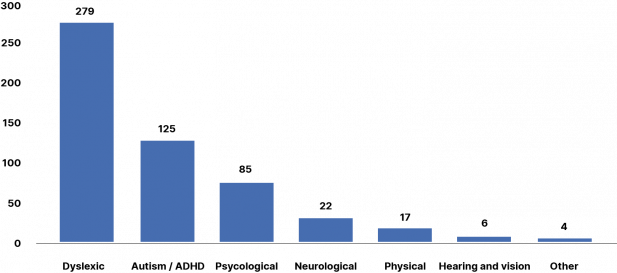
Difficult to choose a study programme?
Choosing the right programme can be overwhelming – for what is the right programme for you and which programme best matches your challenges and needs? When you need extra support, it is even more important to look into, and consider, which programme is the right one for you, and this is where we can help.
Learn more about choosing well and contact one of our study guidance counsellors if you have any questions or need to talk it through.
